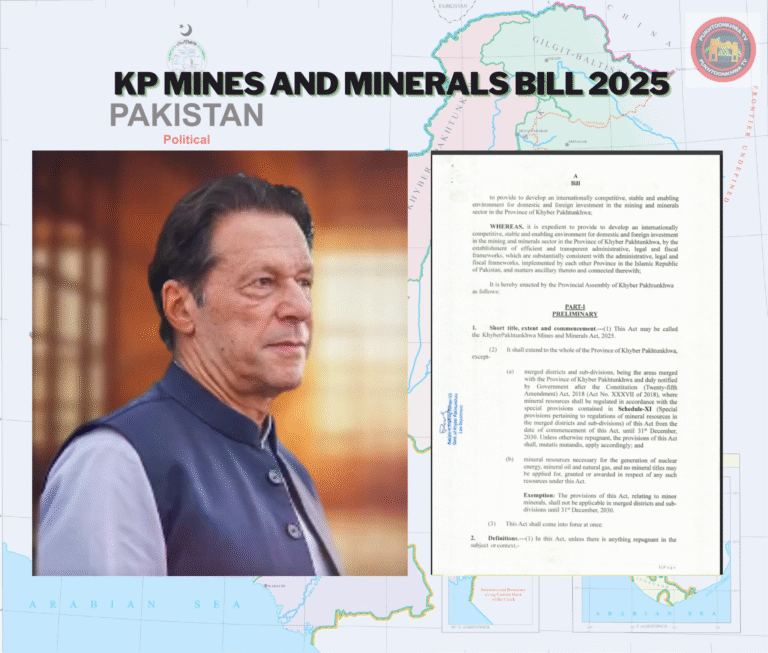PESHAWAR by Khalid Orakzai: The federal Government of Pakistan has proposed a controversial bill for Khyber Pakhtunkhwa with the title of Khyber Pakhtunkhwa Mines and Minerals Bill. The aim of the bill is suggested to bring provincial mining laws in line with those of other provinces and the federal government. The bill is considered focusing on increasing domestic and international investment in KP’s mineral resources.
Most of the ruler party in the KP province the Pakistan Tehreek-e-Insaf (PTI) has rejected the controversial Khyber Pakhtunkhwa Mines and Minerals Bill 2025 with other Nationalist political parties like ANP. Some of the cabinet ministers linked the bill to the party founder Imran Khan’s approval.
The bill is under debate in the KP Assembly, where Chief Minister Ali Amin Gandapur presented comprehensive clarifications on all its key points.
A detailed meeting of PTI’s political committee was also held on the bill.
The committee reviewed all aspects of the bill and unanimously concluded that it contained several provisions which need to be reviewed or explain related to provincial autonomy, rights, or mineral resources to the federal government, Special Investment Facilitation Council (SIFC), or any other federal institution.
Some of the major points of disagreement are as follows,
- According to critics, one major point of disagreement is Section 6(i), which binds the provincial licensing authority to implement recommendations of the Mineral Investment Facilitation Authority (MIFA) and the federal mineral wing.
This move has raised concerns because it grants authority over matters that fall under the provincial domain post-18th Constitutional Amendment to federal institutions that operate under the Ministry of Energy.
The proposed structural changes to MIFA have also come under criticism. The current law (Khyber Pakhtunkhwa Mines and Minerals Act 2017) allows for a seven-member authority chaired by the provincial minister for minerals. The new bill seeks to increase this number to 14, including five provincial ministers.
- Additionally, Section 19(3) grants the chairperson the power to include any person in the authority, which critics say could lead to political interference and a risk of non-transparency in decision-making.
The Khyber Pakhtunkhwa government maintains that nowhere in the bill does it state that the recommendations of the Federal Mineral Wing will be binding for the Mineral Title Committee (MTC).
It is only stated that the MTC will “consider” these suggestions, but implementation will not be mandatory. The purpose of expanding MIFA’s structure to 14 members is to give ownership of decisions related to mineral resources to the provincial cabinet.
Previously, under the 2017 law, only the minister for minerals chaired MIFA, and the rest of the members were bureaucrats. The new structure aims to establish a balance of power between the bureaucracy and the cabinet to ensure oversight.
Any member included at the discretion of the chairperson will not have voting rights, and their role will be limited to expert opinion only, not to influence decisions.
The government has clarified that MIFA, established under the 2017 law, provides strategic guidance and policy recommendations. Its role is advisory and facilitative, while the regulatory authority lies with the licensing authority.
MIFA also assists in determining royalties, fees, and mineral agreements, and promotes investment. Temporary permits for large infrastructure projects, such as dams, are also granted under the 2017 law.
- Another concern of PTI members is linked to Section 2(kk), which mandates that large-scale mining (i.e., investment exceeding Rs500 million) will only be conducted through joint ventures with the government-owned companies.
The industry stakeholders argue that this condition could hamper the growth of the private sector and discourage foreign investment, as the terms of a partnership are not clearly defined.
The Khyber Pakhtunkhwa government states that large mining companies will now obtain leases through profit-sharing agreements with the newly established government-owned “KP Mining Company.” Another issue is related to how rare and strategic minerals will be handled.
- Under the bill, the government or the federal mineral wing through MIFA is authorized to define and declare “strategic” minerals, which has raised concerns about the centralization of control over valuable resources.
The KP government has clarified that only the provincial government will determine strategic minerals, and the federal mineral wing’s role will be limited to consultation. Compared to Baluchistan’s law, this clause in KP’s bill has been modified in favor of the province.
- Further concern is being expressed regarding Sections 19(f), (g), (h), (i), and (k), which assign an advisory role to the federal mineral wing in matters like pricing, eligibility criteria for titleholders, model agreements, and cadaster systems.
Some believe these powers could be used to shift authority from the province to the Centre.
Although the Khyber Pakhtunkhwa government has clarified that while these advisory roles were previously proposed as mandatory, they are now limited to mere recommendations and are not binding.
The federal government states that this bill has been designed to facilitate investment, modernize mining governance, and ensure that local community’s benefit from resource development.
On social media the people of Khyber Pakhtunkhwa have raised many questions about the intentions of federal government and SIFC. Some asked why the federal government and SIFC are suggesting a bill to the province while the current Mines and Minerals bill (2017) is working perfectly, and after the 18TH Amendment, Mines and Mineral is a provincial subject. Therefore, bulldozing a bill of the province in against the law of the country.
Author: Khalid Orakzai





